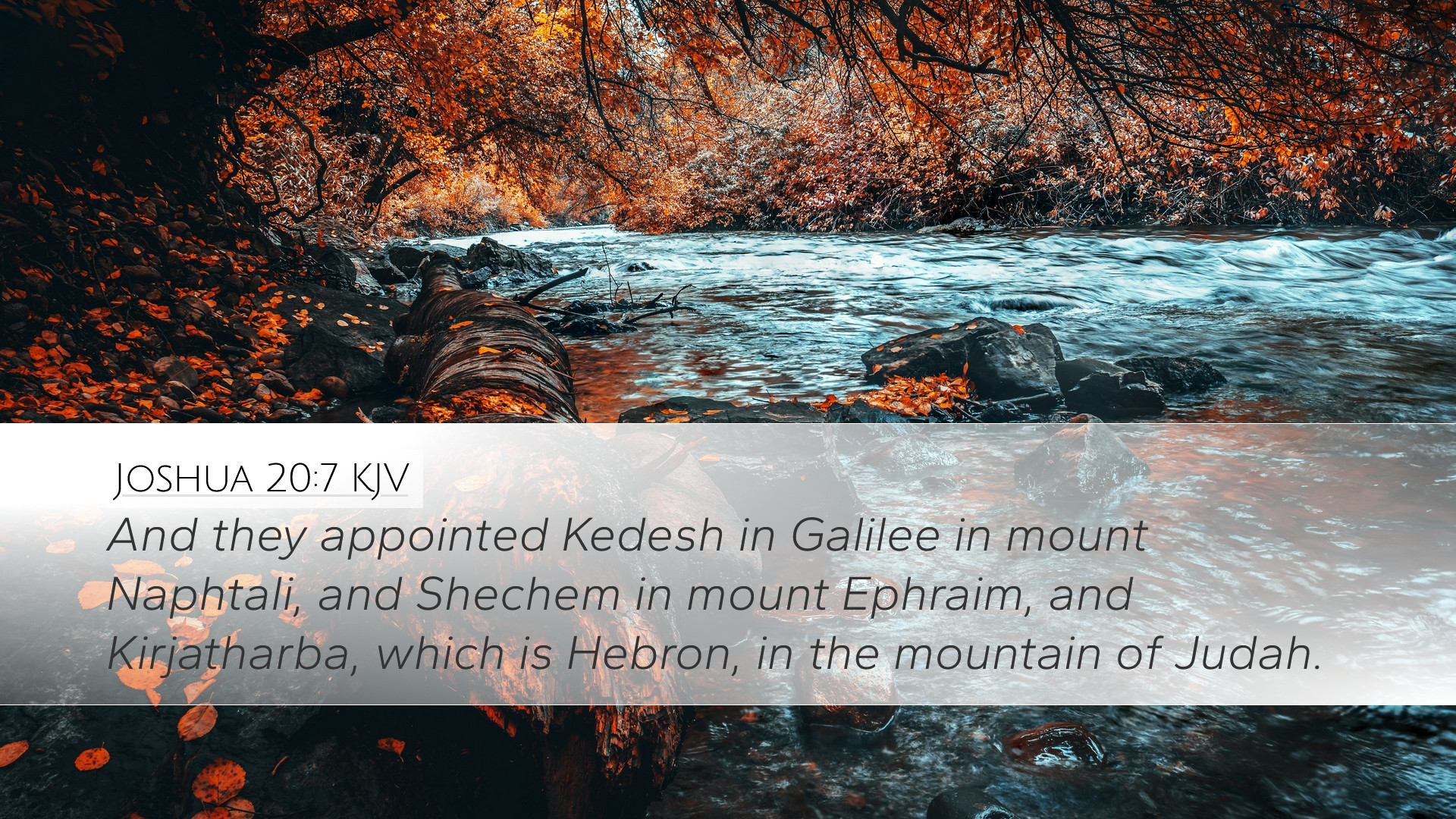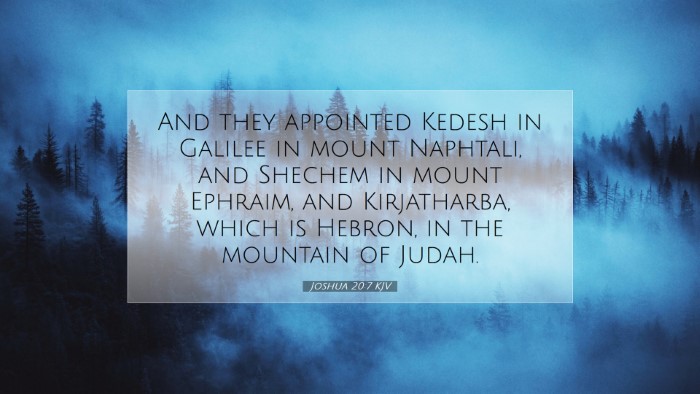Old Testament
Genesis Exodus Leviticus Numbers Deuteronomy Joshua Judges Ruth 1 Samuel 2 Samuel 1 Kings 2 Kings 1 Chronicles 2 Chronicles Ezra Nehemiah Esther Job Psalms Proverbs Ecclesiastes Song of Solomon Isaiah Jeremiah Lamentations Ezekiel Daniel Hosea Joel Amos Obadiah Jonah Micah Nahum Habakkuk Zephaniah Haggai Zechariah MalachiJoshua 20:7
Joshua 20:7 KJV
And they appointed Kedesh in Galilee in mount Naphtali, and Shechem in mount Ephraim, and Kirjatharba, which is Hebron, in the mountain of Judah.
Joshua 20:7 Bible Commentary
Commentary on Joshua 20:7
Joshua 20:7 states: "So they sanctified Kedesh in Galilee in the mountain of Naphtali, and Shechem in the mountain of Ephraim, and Kirjath-arba, which is Hebron, in the mountain of Judah." This verse is pivotal as it marks the establishment of cities of refuge in the land of Canaan, an act rich in theological significance and practical implications for the community of Israel.
Introduction to Cities of Refuge
The concept of cities of refuge is a profound topic in the biblical narrative, offering insights into God's justice and mercy. According to Matthew Henry, these cities were intended to provide a place of safety and atonement for individuals who had committed unintentional homicide. Henry emphasizes that they were not merely places of physical refuge but also centers for spiritual reflection and restoration.
Geographical Significance
Analyzing the geographical placement of these cities, Albert Barnes notes that their locations were strategically chosen to be accessible to all the people of Israel. By being situated in different tribal territories, Barnes highlights that it ensured that any individual seeking asylum could find refuge regardless of their location. This emphasizes a communal responsibility to uphold justice and mercy throughout the land.
Kedesh in Galilee
Adam Clarke provides a detailed examination of Kedesh, signifying its role in the life of the Israelites. Kedesh, which translates to "Holy Place," reflects the sanctification process through which it was set apart as a haven for the oppressed. Clarke notes that the selection of Kedesh underscores God's desire for holiness even in the midst of human imperfection.
Shechem in the Mountain of Ephraim
Shechem, one of the notable cities, served not only as a refuge but also as a historical location for covenant renewal and worship. Henry elucidates that Shechem was significant for its role during the time of Joshua's covenant with the Israelites, marking a spiritual dimension to its establishment as a city of refuge. The mention of this city reaffirms the accountability of the Israelites towards God's commandments.
Kirjath-arba (Hebron)
Hebron, identified in the text as Kirjath-arba, is loaded with historical and spiritual significance. Clarke states that it was the city of Abraham, bringing a lineage of promises attached to it. The selection of Hebron signifies a continuity of God's plans through generations, showcasing God's faithfulness in establishing sanctuaries amidst His people's journey.
Theological Implications
The establishment of these cities of refuge goes beyond mere historical facts; they represent a complex interplay of justice, mercy, and grace. The cities provided an essential mechanism for ensuring justice for those accused of manslaughter while simultaneously offering mercy through sanctuary. Barnes notes that this structure points toward the character of God, who is both just and merciful, reflecting His intentions to protect the innocent and uphold righteousness.
Practical Applications
This narrative has profound implications for contemporary faith communities. It challenges pastors, theologians, and students of Scripture to reflect on how justice and mercy can coexist in their ministries and practices. Matthew Henry suggests that the cities of refuge encourage leaders to foster environments where individuals are welcomed, forgiven, and offered second chances. The concept of refuge exemplifies what it means to be a community rooted in love and grace.
Conclusion
Joshua 20:7 encapsulates vital truths about God's provision for justice and mercy through the establishment of cities of refuge. Each city mentioned in this verse—Kedesh, Shechem, and Kirjath-arba—serves as a reminder of God's unchanging nature and His command for His people to uphold justice, seek refuge, and extend compassion to those in need.
As readers and scholars engage with this text, they are invited to explore its rich meaning and apply its teachings within their contexts, paving the way for communities that reflect the heart of God in matters of justice and mercy.


